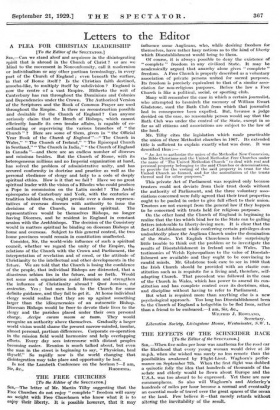Letters to the Editor
A PLEA FOR CHRISTIAN LEADERSHIP [To the Editor of the SPECTATOR.] SIR,—Can we stand aloof and acquiesce in the disintegrating spirit that is abroad in the Church of Christ ? or are we blind to the movement in Nonconformity, call it modernism or individualism or any other partisan terminology, in every part of the Church of England ; even beneath the surface, in that of Rome itself ? Is the Christian faith destined, amoeba-like, to multiply itself by subdivision ? England is now the centre o f a vast Empire. Hitherto the writ of Canterbury has run throughout the Dominions and Colonies and Dependencies under the Crown. The Authorized Version of the Scriptures and the Book of Common Prayer are used throughout the Empire. Is there no reconstruction possible and desirable for the Church of England ? Can anyone seriously claim that the Bench of Bishops, which cannot efficiently handle its own insular affairs, is capable of co- ordinating or supervising the various branches of " the Church " t Here are some of them, given in " the Official Year Book of the Church of England "—" The Church in Wales," " The Church of Ireland," " The Episcopal Church in Scotland," " The Church in India," " the Church of England in Canada "—and there are an endless number of dioceses and missions besides. But the Church of Rome, with its heterogeneous millions and no Imperial organization at hand, has solved the problem of administrative unity, and has secured conformity in doctrine and practice as well as the personal obedience of clergy and laity to a code of deeply spiritual ethics. How is it that we fail ? Have we no great spiritual leader with the vision of a Rhodes who could produce a Pope in commission on the Latin model ? The Archi- episcopates of Canterbury and York, with the centuries of tradition behind them, might preside over a dozen represen- tatives of overseas dioceses with authority to issue the decisions of the Church, in matters spiritual. The representatives would be themselves Bishops, no longer having Dioceses, and be resident in England in constant session with the Archbishops. The decision of the Consistory would in matters spiritual be binding on diocesan Bishops at home and overseas. Subject to this general control, the two home provinces would remain in constitution unaffected.
Consider, Sir, the world-wide influence of such a spiritual
council, whether we regard the unity of the Empire, the relations of the Church with the Crown and Parliament, the interpretation of revelation and of creed, or the attitude of Christianity to the intellectual and other developments in the future. We are told that the Church is losing the confidence of the people, that individual Bishops are distrusted, that a disastrous schism lies in the future, and so forth. Would not some such organization assist Reunion and strengthen the influence of Christianity abroad ? Quot homines, tot sententice. Yes ; but men look to the Church for some definite guidance, and they fail to get it. At home individual clergy would realize that they are up against something larger than the idiosyncrasies of an autocratic Bishop. Diocesan Bishops would be freer to devote their lives to the clergy and the parishes placed under their own personal charge. Accipe curam meam ac tuam. They would recognize an authority above themselves. Gradually a larger world vision would shame the present narrow-minded, insular, almost personal, partisan differences. Corporate co-operation in the mission field would harmonize and help overlapping efforts. Every day sees intercourse with distant peoples becoming easier. Reunion is much talked about, but even the man in the street is beginning to say, " Physician, heal thyself." So rapidly now is the world changing that disintegration may take place and opportunity be lost.
Is not the Lambeth Conference on the horizon ?—I am,












































 Previous page
Previous page